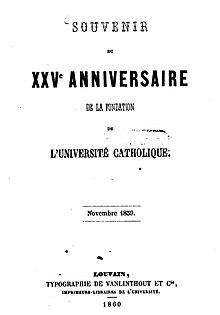
Back Katolieke Universiteit Leuven Afrikaans جامعة لوفان الكاثوليكية Arabic جامعة لوفان الكاثوليكيه ARZ Löven Katolik Universiteti Azerbaijani کاتولیک لون بیلیمیوردو AZB KU Leuven BAN Лёвенскі каталіцкі ўніверсітэт Byelorussian Лёвэнскі каталіцкі ўнівэрсытэт BE-X-OLD KU Leuven Catalan Katholieke Universiteit Leuven Czech
Katholieke Universiteit Leuven[a] | |
 | |
| Latin: Universitas catholica Lovaniensis[1] | |
Other name | Katholieke Universiteit te Leuven[b] |
|---|---|
| Motto | Sedes Sapientiae (Latin) |
Motto in English | Seat of Wisdom |
| Type | Publicly-funded Catholic university |
| Established | 1425 as Studium Generale Lovaniense (predecessor institution) 1834 as Catholic University of Belgium 1970 (split) |
Academic affiliation | CESAER CLUSTER Coimbra Group EASN Association EUA Europaeum EQUIS LERU VIU TPC Una Europa Universitas 21 |
| Budget | €1,5 billion in annual income[2] |
| Chairman | Marianne Thyssen |
| Chancellor | Jozef De Kesel |
| Rector | Luc Sels |
Administrative staff | 11,534 |
| Students | 65,189 (2021–22) |
| 7,172 (2021–22) | |
| Location | , Belgium 50°52′41″N 4°42′00″E / 50.878°N 4.700°E |
| Campus | Main (urban/university town) campus in Leuven and satellite campuses in Aalst, Antwerp, Bruges, Brussels, Diepenbeek, Geel, Ghent, Kortrijk and Sint-Katelijne-Waver |
| Colors | Blue and white |
| Mascot | Fons Sapientiae |
| Website | kuleuven.be |
 | |


KU Leuven (Katholieke Universiteit Leuven)[3][a] is a Catholic research university in the city of Leuven, Belgium. Founded in 1425, it is the oldest university in Belgium and the oldest university in the Low Countries.
In addition to its main campus in Leuven, it has satellite campuses in Kortrijk, Antwerp, Ghent, Bruges, Ostend, Geel, Diepenbeek, Aalst, Sint-Katelijne-Waver, and in Belgium's capital Brussels.[4] KU Leuven is the largest university in Belgium and the Low Countries and the largest Dutch-language university in the world. In 2021–22, more than 65,000 students were enrolled, with 21% being international students.[5] Its primary language of instruction is Dutch, although several programs are taught in English, particularly graduate and postgraduate degrees.[6][7] It is routinely ranked among the top 50 universities in the world by Times Higher Education.[8]
Although Catholic in theology and heritage, KU Leuven operates independently from the Church.[9] KU Leuven previously only accepted baptized Catholics,[when?] but is now open to students from different faiths or life-stances.[10][11]
While nowadays only the acronymic name KU Leuven is used, the university's legal name is Katholieke Universiteit Leuven, officially Katholieke Universiteit te Leuven,[b] which translates in English as Catholic University of Leuven.[a] However, the acronymic name is not translated in official communications, like its similarly named French-language sister university Université catholique de Louvain (UCLouvain).
Cite error: There are <ref group=lower-alpha> tags or {{efn}} templates on this page, but the references will not show without a {{reflist|group=lower-alpha}} template or {{notelist}} template (see the help page).
- ^ Anderson, Peter John (1907). Record of the Celebration of the Quatercentenary of the University of Aberdeen: From 25th to 28th September, 1906. Aberdeen, United Kingdom: Aberdeen University Press (University of Aberdeen). ASIN B001PK7B5G. ISBN 9781363625079.
- ^ "Jaarverslag 2023" [2023 annual report] (PDF). www.kuleuven.be.
- ^ "Basic info legal entity KU Leuven". admin.kuleuven.be. Retrieved 2020-04-30.
- ^ "Studeren aan de KU Leuven, ook buiten Leuven – KU Leuven". Kuleuven.be. Retrieved 2015-10-18.
- ^ "Student Numbers". Kuleuven.be. Retrieved 2023-04-20.
- ^ "International programmes". Kuleuven.be. Retrieved 2014-03-28.
- ^ "Catholic University of Leuven". U.S. News & World Report.
- ^ KU Leuven World University Rankings THE, Times Higher Education, retrieved 2024-02-18
- ^ Bellefroid, Fred. "OECD Quality Assessment – Fostering Quality at the Katholieke Universiteit Leuven" (PDF). OECD.
- ^ "Religion and Philosophical Diversity at KU Leuven". www.kuleuven.be. Retrieved 2020-05-08.
- ^ "Religion in Leuven". www.kuleuven.be. Retrieved 2020-05-08.